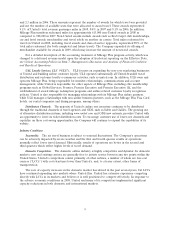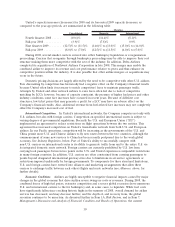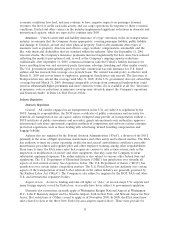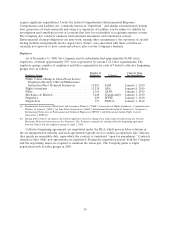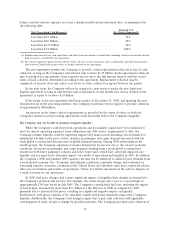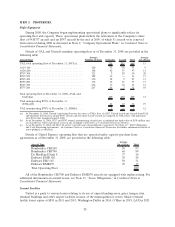United Airlines 2008 Annual Report Download - page 19
Download and view the complete annual report
Please find page 19 of the 2008 United Airlines annual report below. You can navigate through the pages in the report by either clicking on the pages listed below, or by using the keyword search tool below to find specific information within the annual report.Continued periods of historically high fuel costs or significant disruptions in the supply of aircraft fuel could
have a material adverse impact on the Company’s operating results.
The Company’s operating results have been, and continue to be, significantly impacted by changes
in the supply or price of aircraft fuel, both of which are impossible to predict. The record-high fuel
prices each year from 2005 through 2007 increased in 2008 to new record highs with the crude oil spot
price reaching highs of approximately $145 per barrel in July of 2008. At times, United has not been
able to increase its fares when fuel prices have risen due to the highly competitive nature of the airline
industry, and it may not be able to do so in the future and such increases may not be sustainable in the
highly competitive environment. In addition, fare increases may not totally offset the fuel price increase
and may also reduce demand for air travel. From time to time, the Company enters into hedging
arrangements to protect against rising fuel costs. The Company’s hedging programs may use significant
amounts of cash due to posting of cash collateral in some circumstances, may not be successful in
controlling fuel costs and may be limited due to market conditions and other factors. See Note 13, “Fair
Value Measurements and Derivative Instruments,” in Combined Notes to Consolidated Financial
Statements for additional information on the Company’s hedging programs.
Additional terrorist attacks or the fear of such attacks, even if not made directly on the airline industry, could
negatively affect the Company and the airline industry.
The terrorist attacks of September 11, 2001 involving commercial aircraft severely and adversely
impacted the Company’s financial condition and results of operations, as well as prospects for the airline
industry generally. Among the effects experienced from the September 11, 2001 terrorist attacks were
substantial flight disruption costs caused by the FAA-imposed temporary grounding of the U.S. airline
industry’s fleet, significantly increased security costs and associated passenger inconvenience, increased
insurance costs, substantially higher ticket refunds and significantly decreased traffic and revenue per
revenue passenger mile (“yield”).
Additional terrorist attacks, even if not made directly on the airline industry, or the fear of or the
precautions taken in anticipation of such attacks (including elevated national threat warnings or selective
cancellation or redirection of flights) could materially and adversely affect the Company and the airline
industry. The wars in Iraq and Afghanistan and additional international hostilities, including heightened
terrorist activity, could also have a material adverse impact on the Company’s financial condition,
liquidity and results of operations. The Company’s financial resources might not be sufficient to absorb
the adverse effects of any further terrorist attacks or other international hostilities involving the United
States or U.S. interests.
The airline industry is highly competitive, susceptible to price discounting and may undergo further bankruptcy
restructuring or industry consolidation.
The U.S. airline industry is characterized by substantial price competition, especially in domestic
markets. Some of our competitors have substantially greater financial resources or lower-cost structures
than United does, or both. In recent years, the market share held by low-cost carriers has increased
significantly. Large network carriers, like United, have often had a lack of pricing power within domestic
markets.
During 2008, Aloha Airlines, ATA Airlines, Eos Airlines, Inc., Frontier Airlines and Skybus Airlines
all filed for bankruptcy protection. Other domestic and international carriers could restructure in
bankruptcy or threaten to do so to reduce their costs. Carriers operating under bankruptcy protection
can operate in a manner that could be adverse to the Company and could emerge from bankruptcy as
more vigorous competitors.
During 2008, the U.S. airline industry underwent consolidation with the merger of Delta Airlines,
Inc. and Northwest Airlines. There is ongoing speculation that further airline industry consolidation
could occur in the future. United routinely monitors changes in the competitive landscape and engages
in analysis and discussions regarding its strategic position, including alliances, asset acquisitions and
19


